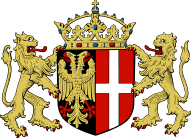 Neuss
NeussHistorisch
Neuss and the Hanseatic League
Neuss and the Hansa
The Hanseatic League or German Hanse refers to the association of Nether German merchants, beginning in the mid-12th century, whose primary aim had been jointly to ensure safety on trade missions and to represent their economic interests in foreign lands. This ‘merchants’ league’ then transformed into a league of towns and trading places, a loose confederation of mainly northern German merchant cities under the leadership of Lübeck, Hamburg and Cologne. As such, this confederation not only exerted economic influence, but also became a political force. In its heyday during the 14th and 15th century, the Hanseatic League comprised of around 200 smaller and larger port and inland cities and towns. From 1356 onwards, some of these participated regularly in the central gatherings of the entire league, known as Hansetage, ‘Hanseatic Days’. The last such Hanseatic Day took place in 1669.
On 2 September 1475, in gratitude for its successful resistance to the almost 12 month-long siege by Charles the Bold of Burgundy, Emperor Friedrich III awarded the City of Neuss ‘all and every honour, dignity, advantage, law and justice of the Hanseatic League’, alongside other benefits. However, this one-off privilege did not make Neuss a member of the Hanseatic League; as an independent confederation, the Hanseatic League made its own decisions as to admissions. In the case of Neuss, this would most likely have been vetoed by its direct competitor Cologne. But this did not prevent Neuss from trading successfully (mainly in wine, salt, grains, cattle and cloth), and also with the Hanseatic League. Neuss trade relations thus extended from the Lower Rhine and the Netherlands to the North German cities and as far as the Baltic countries. Neuss was thus likely one of the many ‘Hanseatic’ towns that did not themselves participate in the Hanseatic gatherings, but were integrated into the Hanseatic trade network thanks to their close family and economic links with their neighbouring larger Hanseatic cities – in the case of Neuss the ‘portal city’ of Cologne.
The old Hanseatic tradition was revived in 1980 in the Dutch Zwolle with the foundation of the modern Hanseatic League, a European network of towns and cities to strengthen economic, political and cultural collaboration. The Hanseatic League of the Modern Age has 175 members from 15 European countries. As one of the founding members, the City of Neuss hosted its first international Hanseatic Day in 1984, on the occasion of its 2000th anniversary celebrations, the second followed in 2022 under the motto of ‘In the flow of time’.
Sources and texts: Neuss municipal archives
